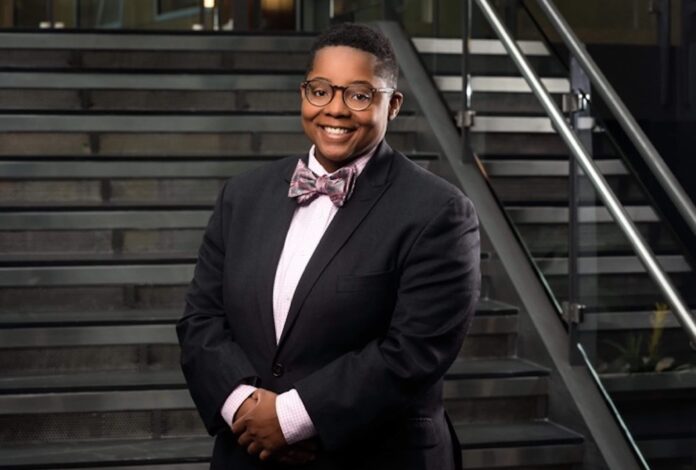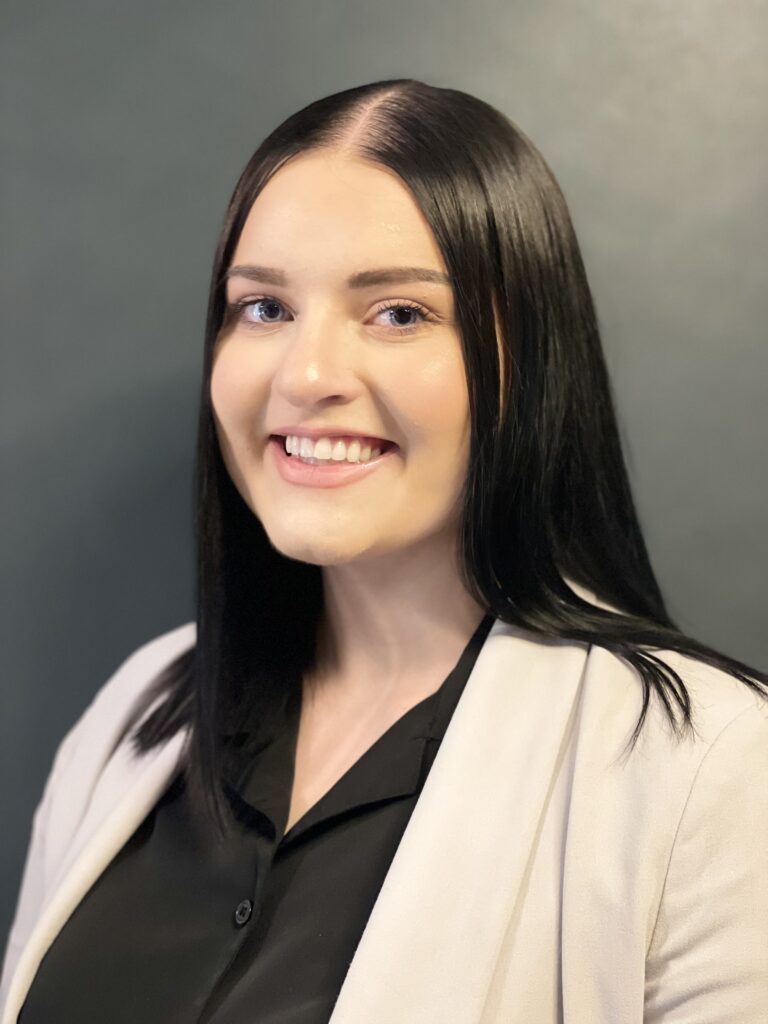
Despite a turbulent climate for LGBTQ rights — or perhaps because of — there seems to be a healthy population of out LGBTQ law students, at least in the Philadelphia area. For Jibri Douglas, a student at Rutgers Law School, their queer identity wasn’t their impetus for going to law school, but they were comfortable about being open about who they are from the get-go.
“I wanted to be a part of a community that accepted me and knew who I was from the outset,” Douglas said. “In my personal statement I talked about my experience with homophobia and queerphobia and transphobia in the military. But I also talked about my experience as a newly trans and queer person in the workforce and how that impacted me, and the ways in which I want to show up for Black and Brown queer trans folks after I’ve become a lawyer.”
Douglas is interested in civil rights litigation, and would like to work for the government, hopefully landing a job in the U.S. Attorney’s Office. As an LGBTQ student, they have found the Rutgers-Camden campus to be a welcoming place where they can be their authentic self.
“A lot of professors on day one ask folks to disclose what their name is, what they prefer to be called and what their pronouns are,” Douglas said. “Sometimes it can be a little antiquated as the law is, where you’ll sit in classes and it’s really binary like ‘Mr.’ And ‘Mrs.’ However, when you ask a professor not to call you either of those, it’s automatically respected. There have been times where I have been misgendered, but it’s an automatic apology.”
Douglas added that school officials have been supportive as they are getting ready to transition and have surgery.
As a student liaison for the Philadelphia LGBTQ Bar Association, Douglas is an affiliate to all the regional chapters of OUTLaw, the student organization for LGBTQ law students. They provide resources, information about scholarships, and details about Philadelphia LGBTQ Bar Association events.
“I’m just kind of that bridge between the student and the Bar Association,” Douglas said.
Heather Zelcs also studies law at Rutgers, where she is vice president of the Rutgers chapter of OUTLaw and serves as diversity and inclusion officer for the Family Law Society. Her interest is in employment law, data privacy and security.

“It makes things a lot more inclusive to be involved with [OUTLaw],” she said. “I feel like if I wasn’t involved in OUTLaw, I wouldn’t feel as part of a community, because it’s not something openly talked about. Everyone in law school is busy as heck, doing a million things. [Being involved] gives time to get to know people and actually feel like you have a space.”
Zelcs said that her queerness imbued more meaning into pursuing a law degree. She plans to use her connections as a future lawyer to be active in the LGBTQ community.
“Being queer, I’m going to have to make sure that while I’m in law school, while I’m a lawyer, that I’m doing something for the community even if that’s not what I’m doing at the law firm,” Zelcs said. “Whether it’s nonprofit, charity, whatever the case may be.”
Sarah Blazucki, who served as editor of PGN from 2006 to 2012 and is now a student at the University of the District of Columbia Law School, said that her work in the LGBTQ community through PGN deeply influenced her decision to attend law school.
“Through working at PGN, and with the LGBTQ community, I came to better understand how the law impacts our daily lives as LGBTQ people,” Blazucki said. “I saw how court decisions at the local, state and federal level could trail behind attitudes about equality or further equality. I’m hopeful that a law degree, along with the communications skills I already have, will help me advocate for greater equality and justice. In addition, working at the paper helped me gain more in-depth knowledge of how court systems work, how laws are passed, and how change is made. It helped me think about how systems worked, and how improvement at a systems level could have a broader impact on people’s lives.”
Blazucki also highlighted the importance to have out LGBTQ lawyers.
“I think it’s important for us to be out and visible, for our clients, our colleagues and those entering the profession after us. When we bring our authentic selves to our work, we can dedicate our full selves to being better advocates for our clients.”
Though many LGBTQ law students today feel comfortable being open about who they are, some may not feel as willing. Stephen Kulp, who is chair of the Philadelphia LGBTQ Bar Association and runs his own legal practice, Kulp Legal, LLC, said that when he was in law school in 2010, he wasn’t living as openly as he does today.
“I felt isolated in law school because of my intersectional identity as an LGBTQ+ AAPI person,” Kulp told PGN. “But there was no hiding the fact that I was an AAPI person in law school (there were few AAPI students in my class, fewer AAPI professors, and the fewest number of law firm representatives, including at [on campus] interviews). So, I looked for the AAPI community at the Asian Pacific American Law Student Association (APALSA). And I was lucky to have found it. But being such a minority impacted how comfortable I was in highlighting the other reason for being othered in this track — being gay. Now I realize that this discomfort stemmed from not being open and authentic. However, I learned this over time; it did not happen immediately. Similar to how I looked for the AAPI community at APALSA in law school, I looked for the LGBTQ+ community at the Philadelphia LGBTQ Bar Association as a lawyer. Once again, I was lucky to have found it.”
Kulp said that LGBTQ law students who are interested can sign up for a free membership with the Philadelphia LGBTQ Bar Association or contact them at [email protected] for more information.
Eric Richwine, who serves as president of the Rutgers-Camden chapter of OUTLaw, said that being a part of the LGBTQ community played a role in his decision to study law, but in a circuitous way. At first, the lack of representation of effeminate gay men in the legal field dissuaded him from pursuing a law degree. Instead, he chose to study vocal performance as an undergraduate.
“When I got to college, I wanted to be involved with some advocacy and affinity groups to ultimately try to find my voice and my queer identity,” Richwine said. “In doing that work, I really was able to cement a career in law as my desired path.”
Richwine said that working with OUTLaw has helped him connect with other law students and practicing attorneys.
“Especially in terms of recent legislation, and it being a scary time for LGBTQIA+ individuals in general, being able to come together with other underrepresented communities in the law school setting has really been such a monumental part of my law school experience,” Richwine said.
Dillon Payne studies law at Villanova University, where he is interested in entertainment law, possibly in the corporate sphere, but hasn’t narrowed down a focus yet. Regarding being an LGBTQ law student, he said he hasn’t had challenges.
“It seems pretty quiet-kept,” Payne said. “There isn’t huge support thrown in the LGBTQ space. But I also don’t feel persecuted in any way. It feels nonexistent, more neutral.”
Payne mentioned the Villanova chapter of OUTLaw, though it typically operates as a general social group where students go to share resources and support each other.
“Law school is huge on sharing notes from professors and passing on information, also passing on job opportunities, and mentorship opportunities,” Payne said.
Despite not personally experiencing anti-LGBTQ sentiment, Payne told PGN that a group separate from Villanova came to the school to protest the fact that as part of its practices, the school embraces gender inclusivity. The group circulated a petition that thousands of people signed.
“It was very trans-specific,” Payne said.
As an African American law student, Payne said there is a dearth of representation in the corporate law field.
“I think less than 3% of corporate lawyers are Black or African American,” Payne said. “So you keep that in the back of your head while you’re in school, and you try to prioritize opportunities, and just have something hammered down before you graduate.”
A 2021 report from Reuters showed that the percentage of Black lawyers dropped slightly over the last decade, from 4.8% in 2011 to 4.7% in 2021. The National Association for Law Placement (NALP) reported that the representation of LGBT lawyers in the 2019 NALP Directory of Legal Employers was 2.99%, a slight increase from 2.86% in 2018.
Zelcs said that when it comes to applying for jobs in the legal profession, she has to be vigilant about being open about her LGBTQ identity in some cases.
“I’ve talked to dozens of big law attorneys [who practice] corporate law,” Zelcs said. “And it doesn’t matter if they have a diversity and inclusion certificate as a law firm. I think talking interpersonally, lawyer to lawyer, that’s where I’ve been told, ‘oh, I feel safe here.’ Every big law firm in Philadelphia will say ‘we’re diverse,’ but you talk to any person, any minority, it’s being there that actually matters.”
Although Richwine said that his experience on campus and with potential employers has been nothing but positive, he acknowledged that many LGBTQ law students are still very wary of whether they will be accepted in the legal field.
“I remember very vividly my first internship interview, having a conversation with the interviewer and I mentioned my boyfriend, and having that panic after the interview,” Richwine said. “[I thought] ‘was that okay to say, is the interviewer going to think differently of me?’ Although things are changing as of recently, I think a lot of those fears are so innate within us and very valid.”
Douglas too emphasized the importance of having a network of law students of similar backgrounds, in their case queer attorneys of color, to pave the way for success as a prospective lawyer.
“Just this week, I was at a diversity reception with the U.S. Attorney’s Office, and I met a bunch of queer and trans attorneys,” they said. “I felt so supported in that moment, to know that when I get to the other side, there will be people there to support me.”
Though Douglas is transitioning, they will still have a nonbinary identity, they said.
“To be able to have people support me and guide me in terms of, how do I disrupt the court system in a sense of talking to judges and saying, ‘instead of calling me Mr. or Mrs. I would prefer for you to call me ‘counselor.’ Really having a community on the other side, it means a lot to me.”
